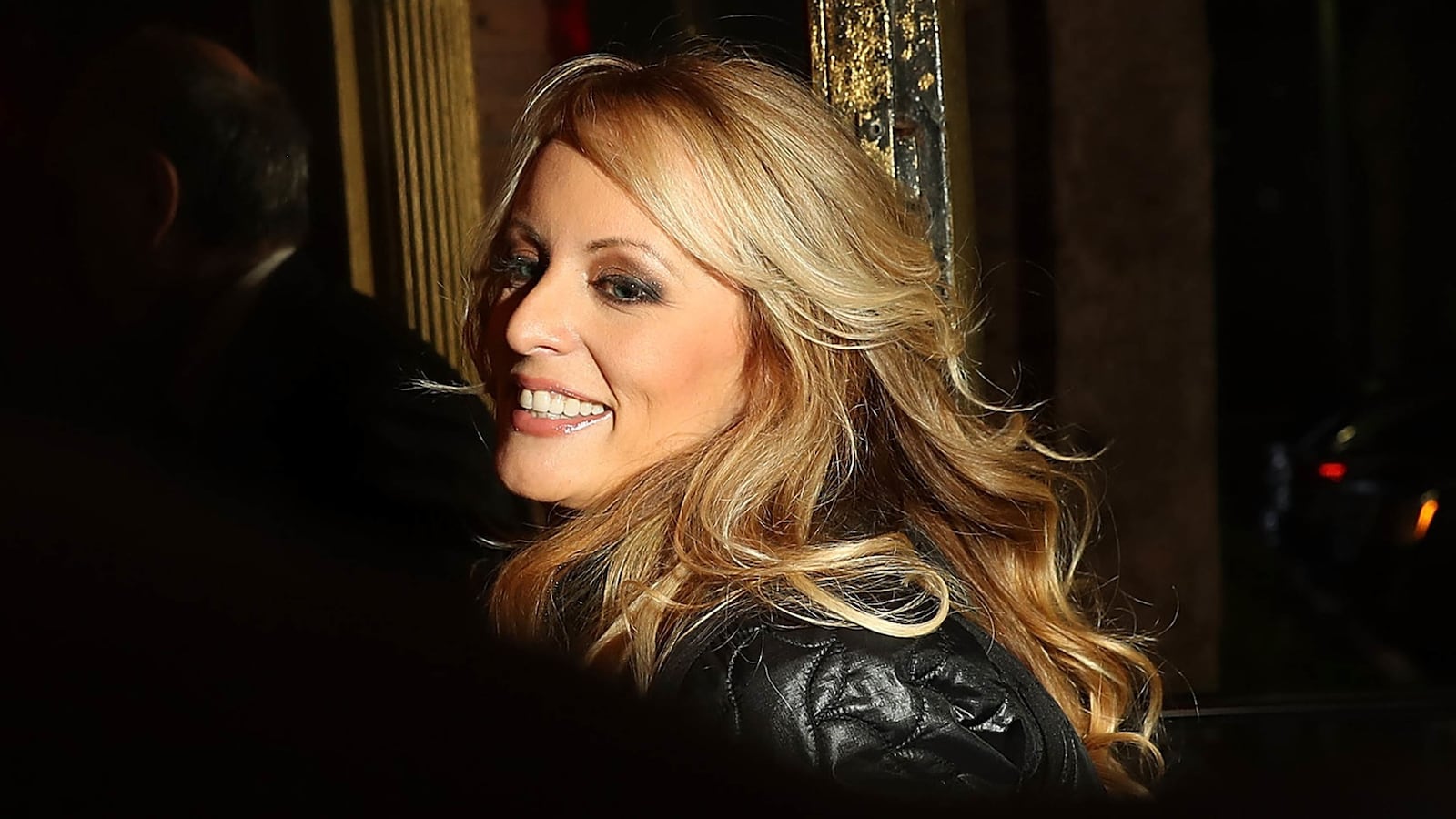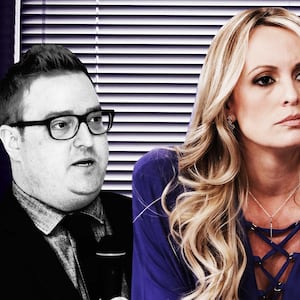Stormy Daniels’ lawyer sent Team Trump into a frenzy in October 2016 with threats to walk and take her alleged affair with candidate Donald Trump public when her hush money was late in showing up, according to court documents unsealed on Thursday. The high-stakes pressure tactics were enough to make jilted Trump fixer Michael Cohen pay up, but only just in time. So how close did l’affaire Stormy come to leaking before the 2016 presidential election?
Welcome to Rabbit Hole.
Tick-tock on the time bomb: Search warrants unsealed in Cohen’s New York criminal case show his frantic (and fumbling) attempt to make good on his hush money payment once porn star Stormy Daniels signed an agreement with him to keep her alleged affair with Trump quiet.
By Oct. 10, 2016, the two sides had signed an agreement laying out the cash-for-silence arrangement in principle. Daniels’ attorney, Keith Davidson, had already piled on the pressure with threats. “If we are ever going to close this deal—in my opinion, it needs to be today,” Davidson texted Cohen, according to a search warrant. But that was just a taste of what was to come.
The problem for Daniels’ side of the deal was that Cohen was late in paying up. The delay appears to be more administrative bumbling on Cohen’s part than a malicious attempt to welch on the agreement. He waited three days to set up an account for another sham company, Resolution Consultants, but forgot to include a driver’s license and passport number in the account registration paperwork. He ultimately ditched Resolution Consultants and used another sham company to pay Daniels, Essential Consultants. Cohen told the House Oversight Committee that by this point, Trump had already instructed him to pay Daniels, but from her lawyer’s perspective, it sure would’ve looked like bad faith.
Threats: When Davidson threatened to walk away from the agreement days later and go public, he kicked off what the FBI said was “a flurry of communications” among Cohen and executives from AMI, the parent company of the National Enquirer.
It’s unclear how AMI staff heard about it or whether Davidson was behind it, but just as Davidson threatened to walk, AMI exec Dylan Howard told Cohen he’d heard that Daniels was prepared to speak to the Daily Mail about the alleged affair. Davidson had stopped taking Cohen’s calls, throwing both him and Trump’s allies at AMI into a panic.
The next day, someone leaked word of the alleged affair to TheSmokingGun.com. The story, run under the headline “Donald Trump And The Porn Superstar,” couldn’t confirm an affair, only rumors of it from an anonymous friend of Daniels. But it was enough to light a fire under Cohen, get him in touch with Davidson, and get the money paid. Had Cohen stumbled or delayed any further, though, it’s entirely possible that Davidson could’ve taken his client’s story to another outlet and potentially affected the outcome of the 2016 election.
Hope: Did Hope Hicks discuss the Stormy Daniels issue with Trump and Cohen during those two October phone calls? The FBI agent who applied for the Cohen search warrant seemed to think it’s at least possible
He wrote that the pattern of communications among Cohen and Trump, Hicks, and AMI executives led him to believe that “at least some of these communications concerned the need to prevent [Stephanie] Clifford [Daniels’ real name] from going public, particularly in the wake of the Access Hollywood story.” The call also stood out to the FBI because it had noticed that previous call records showed Cohen didn’t often call Hicks or Trump throughout the course of the campaign.
Hicks told an FBI agent that “To the best of her recollection, she did not learn about the allegations made by [Daniels] until early November 2016,” according to a footnote in one warrant. However, as the FBI flagged in a footnote, “Hicks was not specifically asked about this three-way call” among her, Trump, and Cohen on Oct. 8. When Rep. Sheila Jackson-Lee (D-TX) questioned Hicks during a House Judiciary appearance in June about whether she’d ever discussed Daniels with Cohen or Trump, she said “no.”
When Cohen testified before the House Oversight Committee, he offered another explanation for at least one of his two calls with Hicks in early October: the release of an Access Hollywood tape showing Trump bragging about sexually assaulting women on an open microphone. Cohen said he was in London with his daughter when Hicks called and she said “she had just spoken to Mr. Trump and we need you to start making phone calls to the various different news outlets that you have relationships with, and we need to spin this. What we want to do is just to claim that this was men’s locker room talk.”
The Cohen warrants say there were two calls: a three-way call with Hicks, Cohen, and Trump, and a shorter call between Cohen and Hicks just a few minutes after. Was the Access Hollywood conversation the subject of one? Both?
The House Judiciary Committee would certainly like to know. An official there told The Washington Post that they’re investigating whether Hicks lied to the committee during her appearance in June.
Essential Consultants: We also learned a little bit more about why some of Cohen’s clients hired him after the election (via his sham company used to pay off Daniels). The feds were tipped off to Cohen’s criminal dealings in part because the transactions in Essential Consultants’ bank accounts didn’t line up with Cohen’s stated purposes for opening the company, leading his bank to file suspicious activity reports.
In the warrants unsealed on Thursday, the FBI described how it questioned the companies paying money into the company’s accounts about why they had hired Cohen. Broadly speaking, the FBI said the companies paid Cohen “for political consulting work, including consulting for international clients on issues pending before the Trump administration.” Employees for AT&T told the FBI they hired Cohen “to consult on political issues, including net neutrality, the merger between AT&T and Time Warner, and tax reform.” Swiss pharma giant Novartis said it hired Cohen “to gain access to relevant policymakers in the Trump Administration.”
Cohen was convicted of tax and bank fraud as well as making illegal campaign contributions in the form of hush money payments to Trump’s alleged mistresses. He was sentenced to three years in prison and began serving his sentence in May.







